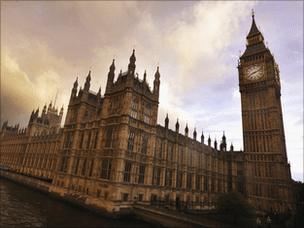Harrabin's notes: Is the UK facing 'green subsidence'?
- Published
In his regular column, BBC environment analyst Roger Harrabin asks how claiming to be the "greenest ever government" squares with scrapping your official advisers on sustainable development.
DROPPING THE BALL
When David Cameron announced the "greenest ever government", then scrapped his key advisory bodies, it looked like a football boss chasing a goal by removing his strikers from the pitch.
Have no fear, the PM assured. It would be (my words, not his) the political equivalent of total football, pioneered by the legendary Ajax team of the 1970s in which every player was both attacker and defender.

Weakening institutions of sustainability will weaken government's ability to deliver, experts warn
Sustainable development was so important that every department would keep its eye on the green ball. The task wouldn't be left to the environment department Defra and its advisers.
Most environmentalists waited to see whether Mr Cameron's strategy would emerge for victory on the most elusive of goals - developing the economy, society and the environment at the same time.
Well, now they've seen the strategy - and they don't like it.
This week ministers published - at an odd time of the day and without a fanfare - a slender document entitled Embedding Sustainability at the Heart of Government, external.
The objective would be achieved by elevating Environment Secretary Caroline Spelman to the government's powerful Economic Affairs Committee - the sort of thing environmentalists have been recommending for a long time.
Other departments would have all their policies vetted for sustainability criteria by her department, Defra, which would also develop "real measurable indicators for progress".
Ms Spelman explained: "Moving to a long-term, green and sustainable economy is essential if we are to rebuild our finances, improve our quality of life and protect our natural environment.
"Genuine sustainability will never again be an add-on or afterthought. It will be at the heart of everything we do - from making policy to running government buildings or purchasing goods and services."
Pinpointing weakness
It sounds well-meaning. But at a meeting organised by the soon-to-abolished Sustainable Development Commission (SDC) this week, few believed it would deliver.
Speakers expressed their dismay that there would be no overarching sustainable development policy across the British Isles, and queried whether the prime minister would claim to represent the UK if he attended the Rio Earth Summit + 20 next summer.
The former head of the SDC, Jonathon Porritt, was first to open fire.
"First they killed the SDC," he said, "now they are trying to kill off sustainable development itself.
"(This) is - without a doubt - the most disgraceful government document relating to sustainable development that I have ever seen - its clear intent is to marginalise SD to the point where it will be all but invisible."
Mr Porritt complained that the government rejected a recommendation from the Environmental Audit Committee to create a minister responsible for sustainable development in the Cabinet Office.
"It will therefore stay within Defra," said Mr Porritt, "the weakest department in Whitehall, with the weakest set of ministers anyone can remember.
"Does anyone suppose that any other departments will pay the slightest attention when Defra 'reviews plans in relation to SD principles'?
"The role of the Lib Dems in this dismantling exercise remains startling.
"What does this 'vision' tell us about those benighted and deluded Lib Dem MPs who always thought that SD was one of their greatest strengths - instead, now, of a source of enduring shame?"
Central scrutiniser?
There was particular concern at the meeting about the decision of the government to scrap independent scrutiny of sustainable development policy. The government said the Commons Environmental Audit Committee would scrutinise policy in future.
But Joan Walley, chair of that committee, told BBC News: "There's no chance the role we play within parliament can in any way substitute for the detailed monitoring appraisal role that the SDC has had - assessing policy and pulling government up when it goes wrong.
"We simply don't have the expertise or the resources. And more to the point we have seen no evidence to suggest that the government has the resources either.
"This is a massive and extremely complicated agenda - it needs the sort of lateral thinking that's almost impossible for government or MPs to provide.

Joan Walley has grave reservations about her committee's capacity to deliver
"This agenda needs action on the ground in every department, in the Treasury and on the international stage as it takes strategy forward. We have no idea how the government expects to achieve that."
She complained that her committee warned the government that Defra was not the best place from which to drive sustainable development across government.
Halina Ward from the Foundation for Democracy and Sustainable Development is a specialist in institutional reform. She described the government's document as "a hugely disappointing piece of work".
Like other speakers, she complained that the government had not set sustainable development in the publicly-accessible context of the need to create a decent life for nine billion people on the planet while protecting the environment.
"There's the lack of vision in this vision statement," she said.
"[There is] nothing about the overall contextual challenges: global population growth, natural resource scarcity or commodity price spikes (for foodstuffs and oil), for example. There's no sense of urgency about anything very much aside from tackling the deficit - now bafflingly part of the government's definition of sustainable development.
"Then there's the misleading.
"The document says, for example, that the Rio+20 conference next year will focus on 'the role of the green economy and poverty eradication in the context of SD'. There are two main themes for Rio+20 - the green economy is indeed one, but the second is 'institutional frameworks for sustainable development' - which might as well not exist so far as this document is concerned.
"The government has just dismantled parts of the UK institutional framework that we could have been really proud of in the run-up to Rio, including the independent SDC.
"The coalition government has no sustainable development strategy; no commitment to a sustainable development white paper, nothing for departments to look to as they develop their business plans."
Cynical question
Some at the SDC meeting considered that Mr Cameron's actions on this agenda were cynical - that'd he'd planned to marginalise it.
Most people I spoke to, though, thought Mr Cameron's intentions were sincere, even if his plans were inadequate. Will Day, the current SDC chair, told me he wanted to believe that the government's strategy would work.
Ms Spelman told me the government was genuinely committed to the issue - and that its intentions would become clear over time.
"From the business plans of all the government departments, it's clear they spontaneously have sustainable development at their heart," she said.
"Planning has a new approach that sustainable development is the key criteria going forward. The transport department will have a sustainable railway system; so on and on it goes throughout departments.
"It's right that secretaries of state should be held to account by the Environmental Audit Committee to demonstrate sustainable development is integral to the work they are doing in their departments."
When I mentioned that Ms Walley said her committee had neither the resources nor the expertise for the task, Ms Spelman said she would urge the Public Accounts Committee to help the EAC with resources.
Defra, not the Cabinet Office, she insisted, was the right home for the agenda.
Halina Ward, however, was not convinced.
"The coalition government is making itself vulnerable to policy subsidence," she said.
"That's what you get when a policy is based in no more than rhetoric."
- Published3 March 2011
- Published16 February 2011
- Published22 July 2010